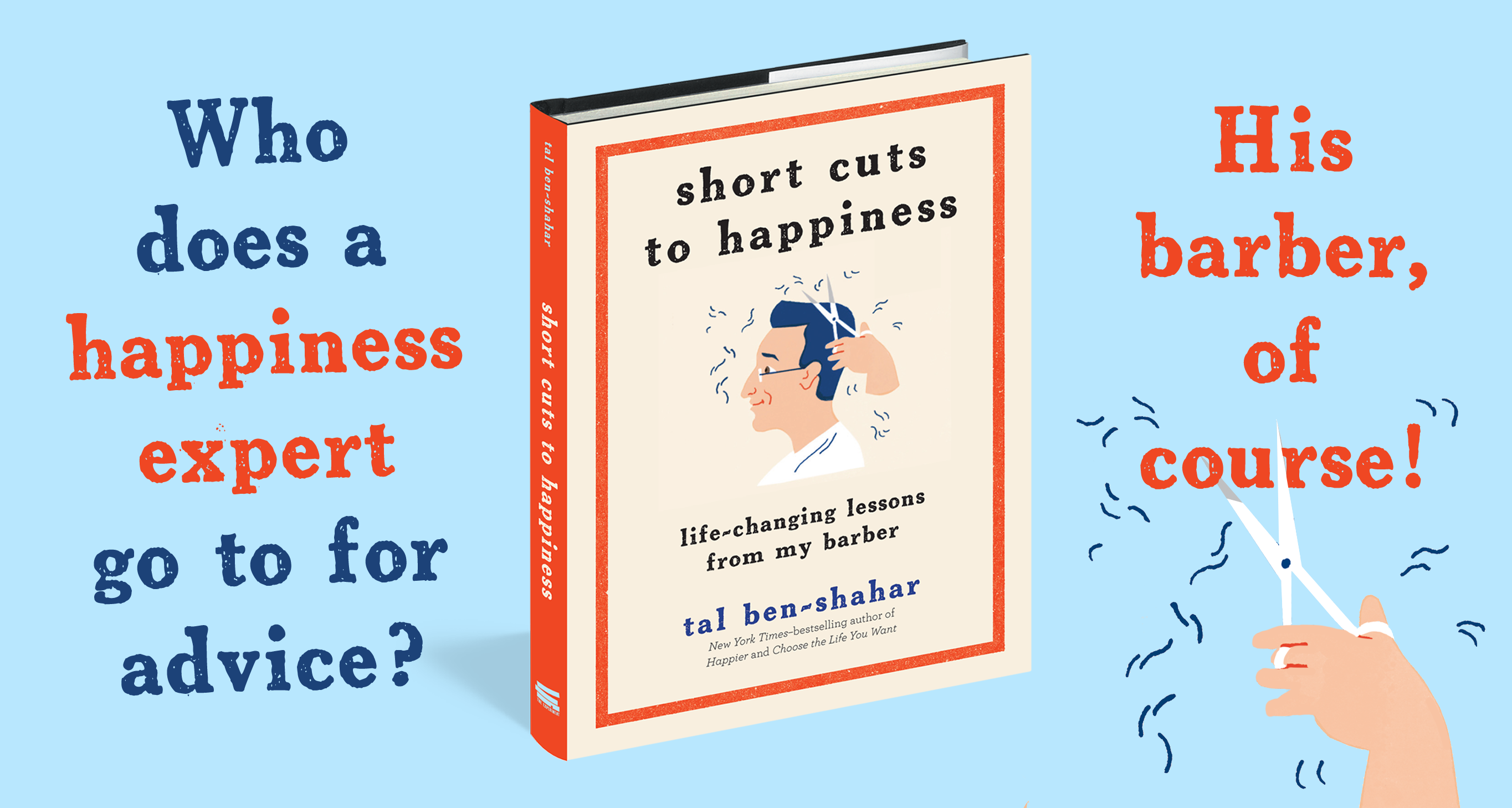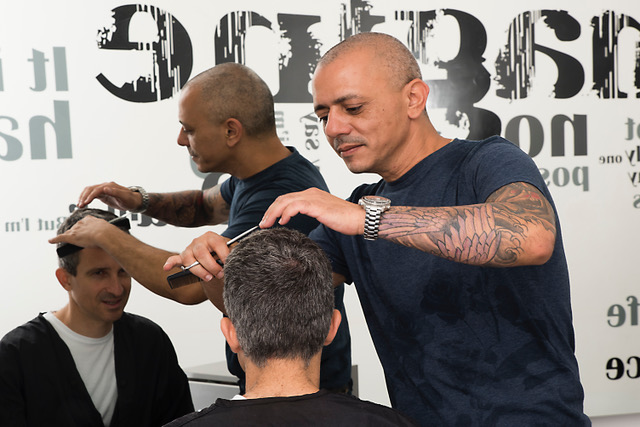
We are constantly seeking advice on everything from work, to romance, to family, to major life decisions as many of us understand that we do not have all the answers; sometimes we need guidance to make the choices that can help improve our lives and bring us joy. But you might be surprised to learn that even world-renowned happiness expert, Tal Ben-Shahar, needs advice too, and he gets it from an unlikely source: his barber.
In Short Cuts to Happiness, Ben-Shahar shares two years’ worth of barber shop talk and advice that has been distilled into small snippets of wisdom and inspiration. With anecdotes that touch upon the importance of laughter, taking vacations, thoughts on raising children and even the meaning of life, this book is a lovely path to personal happiness.
In the following excerpt, Tal discusses his close friendship with his barber Avi, and shares just one of many pearls of wisdom that he learned from the wise-beyond-his-years hairdresser.
We go to the hair salon or barbershop in search of some kind of change. We ask for anything from a minor trim to a major cut, a barely perceptible highlight to a transformational new color. Many of us, however, secretly or openly desire to go beyond external change, beyond altering the way our head looks from the outside. What we truly seek is internal change—anything from a trim to a transformation of that which goes on inside our head.
As a result, many of us tend to have a special relationship with our hairdresser or barber. We freely share our cares and concerns, our sorrows and secrets, as we seamlessly extend the trust we have in their adept hands, swinging sharp scissors, to an overall trust in them. And when our defenses
are down, when resistance is gone, when the wall separating us from the world collapses, it is then
that we are ready to listen, to grow, to learn.
This book is about the big lessons I learned from my barber, Avi Peretz, who for almost twenty years has been working in the same small salon in a small neighborhood in Ramat Hasharon, a small suburb of Tel Aviv. The salon is a well-known fixture in the local landscape, located in the neighborhood center, alongside Café Caramel, Yuval’s convenience store, and Jacob’s grocer. Together, these entities encircle an area paved with large tiles, unevenly spread, some of them broken; a wooden bench that was once green, now worn out by the harsh Mediterranean sun; and a few dozen postboxes, each belonging to a family living nearby. Witnessing this all is the old tree with roots bulging out of the paved floor, providing shade to the grown-ups talking about their new startup, the children playing tag, the cats and dogs and pigeons coexisting peacefully.
In the midst of all this, Avi’s salon is a gathering place that provides women, men, and children
living in the neighborhood much more than a hairdo. His relaxed manner and generous hospitality, his wit and wisdom, affords people just what the fast-paced, high-tech, postmodern world lacks.
* * *

I had been going to Avi for a haircut since 2010, shortly after returning to Israel from the United States. And though I always enjoyed my time in the salon, and always learned something from Avi, it was only in 2014 that I started to take notes, to document the lessons I learned each time I visited.
It was ten years earlier, almost to the day, that I submitted my doctoral dissertation. Whether this was a coincidence or a carefully orchestrated move by my subconscious I don’t know, but the point is that since 2004 when I completed my academic training, I had a persistent desire to return to school, to learn in a formal setting again as I had done for most of my life. And while I continued to read extensively after graduating, I missed the face-to-face learning I had been accustomed to as a student in a classroom. Starting to write this book was my formal return to informal education—only instead of a classroom I attended the salon; instead of a professor there was my barber. The lectures were short rather than long, with silence creating space around the words—words that were inspiring and thought-provoking, that communicated little theory and much practical wisdom.
In the following pages I try to convey the spirit and substance of Avi’s teachings as I encountered them. Toward that end, the chapter progression is chronological, which means that some topics are addressed more than once at different points throughout the two years. Were I writing a traditional
book or offering a traditional course, these chapters would have appeared in close proximity to one another, but I felt that going the traditional route would have taken away from the spirit of Avi’s teaching—a spirit that is organic, natural, free of constraints, aligned with the way life unfolds.
I recommend that, to make the most of this book, you take your time reading each chapter and, after reaching the end of the chapter, spend a few minutes doing nothing, reflecting in silence, letting the ideas sink in. After you’re done reading the book, you can leave it by your bedside or on your desk, and then every day dedicate a few minutes to reading a single chapter and applying its insights throughout the day. You can read through the chapters in sequence, starting at the beginning; you can pick your daily chapter by browsing the table of contents; or you can randomly open these pages, book an appointment with fate, and maybe discover a short cut to happiness.
on beginnings and what really matters
It was March 14, 2014. I was going through a particularly difficult period, drowning myself in existential angst over the “big picture” questions. I had just finished teaching an intensive yearlong program in positive psychology, and felt the emptiness that often follows an emotional high. What should I do next? What do I want to do with the rest of my life? Am I making a real difference? Does any of it matter?
And, to make things worse, I was about to board a long flight to China to deliver another lecture, and I couldn’t help but think of Sisyphus who has just reached the peak, only to be summoned to the foot of the mountain once more, to go through the motion, once again, and again, and again.
I also desperately needed a haircut, so a couple of hours before I had to leave for the airport I went
to my barber, Avi Peretz. As I was waiting on the sofa in his salon, I heard a female client ask Avi
whether he had already received his pilot’s license; Avi responded that he hadn’t. When it was my turn,
I couldn’t help but inquire further.
“I didn’t know you were working toward a pilot’s license.”
“Yes, I did it because I thought it would be the answer to the emptiness I experienced sometimes.
There were, in fact, many other things that I thought would fill me up, but I realized that I was
looking in the wrong places.”
“So what does fill you up?”
“The little things that are right here.” He pointed with his hand, the one without the scissors, to the
ground where he was standing. “It’s right here. Not up there, or out there.”
“What are those little things for you?” I asked.
“Oh, it’s the usual stuff. Spending time with my kids, listening to music, going to the beach.” He then
smiled and added, “Talking to my clients.”
Being reminded of the value of the “usual stuff” shifted my focus from fretting over the big questions to appreciating the little answers, as I’d recommended countless times before and was in fact about to lecture on the following day. I felt much better leaving Avi’s place than I had entering it, and it cost me only seventy shekels (plus I got a free haircut for it, too).
This was not the first time that Avi made me feel better, and I know that other clients of his have had similar experiences. I also know that I am not alone in receiving valuable, potentially life-
changing advice through unexpected day-to-day conversations—with a barber or a taxi driver, with a gardener or the cashier at the local convenience store.
These words make a difference—and can make even more of a difference if we pay close attention to them—because they remind us of commonsense solutions to our universal human problems: the short cuts that are right in front of us, but that we often forget or neglect.
The French philosopher Voltaire once quipped that “common sense is not so common.” Walking home after my haircut, I resolved to make Avi’s common sense more common, so that I could refer back to it in times of need and so that others—who are not privileged to have him as their barber—could enjoy his wisdom.




